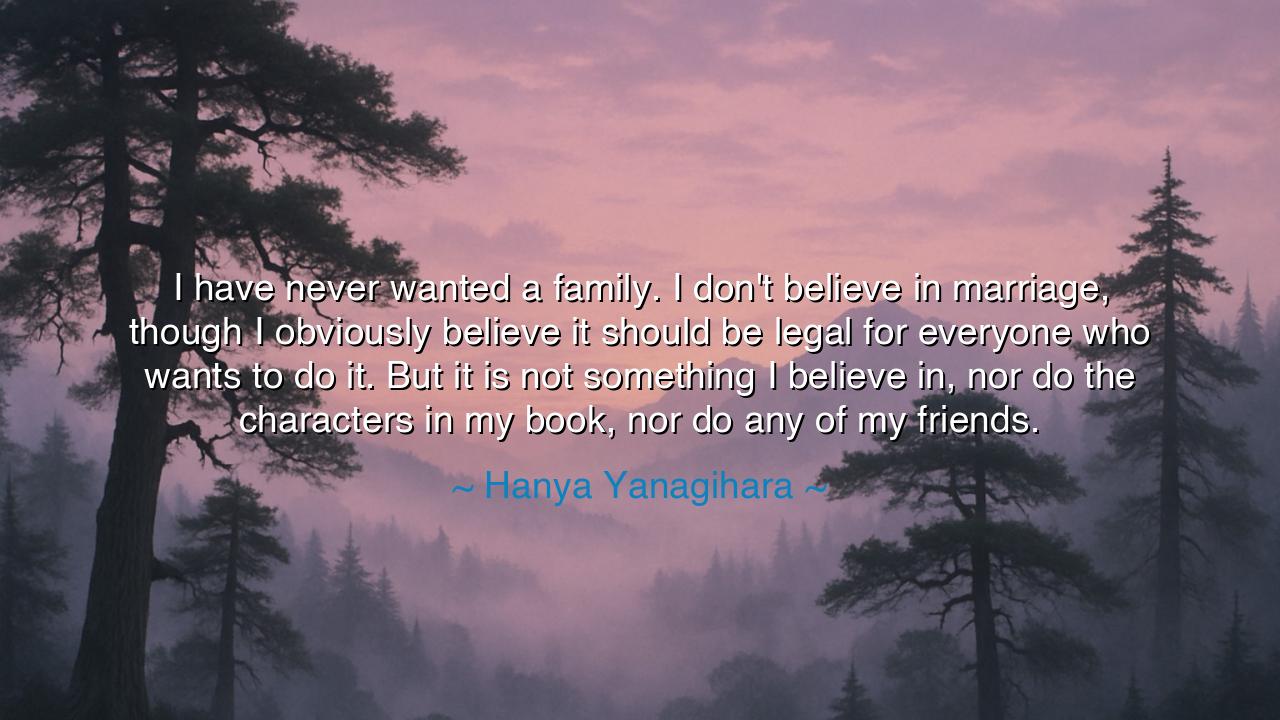
I have never wanted a family. I don't believe in marriage, though
I have never wanted a family. I don't believe in marriage, though I obviously believe it should be legal for everyone who wants to do it. But it is not something I believe in, nor do the characters in my book, nor do any of my friends.






In the words of Hanya Yanagihara: “I have never wanted a family. I don’t believe in marriage, though I obviously believe it should be legal for everyone who wants to do it. But it is not something I believe in, nor do the characters in my book, nor do any of my friends.” These words are startling, not because they deny the rights of others, but because they dare to stand against one of the oldest institutions of humankind. They are not words of disdain, but of independence—a declaration that fulfillment does not always wear the robes of tradition, that life’s meaning may be found outside the bonds of marriage and the raising of family.
The ancients often lifted up the hearth and household as the cornerstone of society. To them, the family was the seed of the city, the place where virtue was taught and where the fire of continuity burned. Yet even in those times, there were voices that resisted. The Stoics, for example, spoke of the individual soul’s sovereignty, teaching that happiness came not from external arrangements but from the discipline of the mind and the pursuit of wisdom. Yanagihara echoes this ancient spirit, declaring that one can live fully without kneeling before the altar of custom.
Her belief is not a condemnation of others, but an affirmation of freedom. By insisting that marriage remain legal for all, she recognizes the justice of equality. But she also reminds us that justice must include the freedom to abstain, to walk another path, to choose solitude or friendship or art over the roles that society presses upon us. In this way, her words are both radical and generous: radical in rejecting what is assumed to be universal, generous in affirming the rights of those who choose differently.
History gives us examples of such lives. Consider the philosopher Diogenes of Sinope, who scorned institutions and customs, declaring that he belonged not to family or city but to the world itself. Or consider Emily Dickinson, who never married, but who gave the world poems of infinite depth, poems that still illuminate the human spirit. These figures remind us that the absence of marriage or family does not mean the absence of meaning. Life may be shaped by other callings—by words, by art, by friendship, by truth.
The deeper meaning of Yanagihara’s words is that each life must be authored individually. To follow blindly the patterns of family and marriage without question is to risk living a borrowed script. But to pause, to consider, to reject what does not resonate—this is the beginning of authenticity. Her characters, like her friends, walk this path, showing that communities can be formed outside of bloodlines, that love can exist without contracts, and that fulfillment can flourish in forms unrecognized by tradition.
Yet her declaration also calls us to compassion. For those who reject marriage or family are often misunderstood, seen as incomplete, selfish, or strange. Yanagihara reminds us that they too are whole, and that their paths are no less valid than those who find joy in children or spouses. To honor freedom means not only defending the rights of the many, but also protecting the dignity of the few who choose differently.
So let this teaching endure: do not assume that the meaning of life is written only in the cradle and the wedding ring. Recognize that some souls are called to other tasks, and that their creations may nourish the world as deeply as any family line. In your own life, examine your desires honestly: do you seek marriage and family because your heart longs for them, or because the world tells you to? Choose freely, and honor the freedom of others. For as Yanagihara teaches, the true measure of a life is not conformity to tradition, but fidelity to one’s own spirit.






AAdministratorAdministrator
Welcome, honored guests. Please leave a comment, we will respond soon